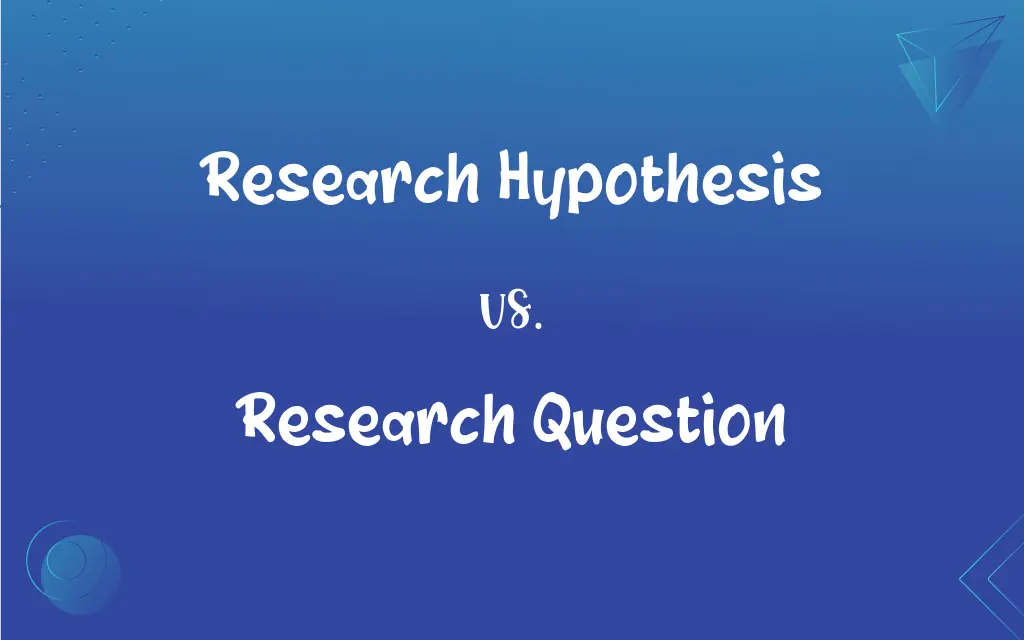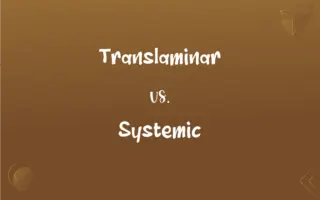Research Hypothesis vs. Research Question: What's the Difference?
Edited by Harlon Moss || By Janet White || Published on March 4, 2024
A research hypothesis is a specific, testable prediction about the outcome, while a research question is an inquiry that guides the direction of the study.

Key Differences
A research hypothesis and a research question are foundational components of any scientific study, yet they serve different purposes. A research hypothesis is a specific, testable prediction that outlines the expected outcome of the study based on existing theories or observations. It implies a relationship between two or more variables that can be either supported or refuted through experimentation. Conversely, a research question is a broad inquiry that defines the problem or area to be explored without making a specific prediction. It sets the stage for the investigation, determining the focus and scope of the research.
The formulation of a research hypothesis and a research question reflects different stages in the research process. Initially, a researcher might start with a research question, which identifies the key aspects or variables of interest in a study. This question arises from a gap in the current knowledge or a problem that needs solving. After reviewing the literature and refining the research question, a researcher may then propose a research hypothesis, suggesting a possible answer or solution that the research will aim to test.
A research hypothesis requires a certain level of theoretical background to propose a predicted relationship, a research question can be developed with a more exploratory approach. The research hypothesis is grounded in the literature, suggesting a cause-and-effect relationship that can be empirically tested. On the other hand, a research question might not presuppose any specific relationship but rather seeks to explore an area more broadly to understand what relationships might exist or how they operate.
The specificity and directionality of a research hypothesis differentiate it from a research question. A research hypothesis is often directional, indicating not just that a relationship exists but also predicting the nature of this relationship. It is formulated in a way that lends itself to statistical testing, allowing for the confirmation or rejection of the hypothesis. In contrast, a research question is open-ended, guiding the research in a general direction without presupposing any specific outcomes or relationships. It asks what is happening, why, or how, setting the groundwork for more detailed investigation.
Both a research hypothesis and a research question are crucial for conducting scientific research, but they play different roles. The research hypothesis makes a specific prediction about the outcome of the study, based on a presumed relationship between variables. It is directly testable and aims to be either confirmed or disconfirmed. The research question, however, is broader and aims to identify and define the problem or area of interest that the research will address. It is the starting point from which a detailed investigation begins, possibly leading to the formulation of one or more hypotheses.
ADVERTISEMENT
Comparison Chart
Nature
Specific, testable prediction about the relationship between variables
Broad inquiry into a problem or area of interest
Purpose
To be tested through research to support or refute
To guide the direction of research
Formulation
Based on existing theory or observations
Arises from identified gaps in knowledge
Directionality
Often directional, predicting the nature of the relationship
Open-ended, exploring what, why, or how
Relationship to Research Process
Follows from the research question; proposes a solution
The initial step that identifies the focus of research
ADVERTISEMENT
Research Hypothesis and Research Question Definitions
Research Hypothesis
A research hypothesis is derived from theoretical frameworks or previous studies.
Based on social learning theory, the research hypothesis expected that exposure to violence increases aggression.
Research Question
A research question is open-ended, allowing for exploration of various aspects of a topic.
How does bilingual education affect children's cognitive development?
Research Hypothesis
A research hypothesis is a stated assumption about a relationship that can be tested.
The research hypothesis posited that increased sunlight boosts plant growth.
Research Question
A research question is an inquiry that defines what the study aims to explore or solve.
What effect does daily exercise have on anxiety levels?
Research Hypothesis
A research hypothesis is often directional, suggesting how one variable affects another.
The research hypothesis predicted that higher temperatures would decrease snowfall.
Research Question
A research question can be broad, setting the stage for narrowing down into specific inquiries.
What factors influence consumer trust in online marketplaces?
Research Hypothesis
A research hypothesis can be null, suggesting no relationship, or alternative, suggesting a specific relationship.
The null research hypothesis stated that diet has no effect on mood.
Research Question
A research question guides the research process without assuming an outcome.
How does remote work impact employee productivity?
Research Hypothesis
A research hypothesis predicts the outcome of a relationship between variables.
Her research hypothesis was that sleep quality improves with reduced screen time.
Research Question
A research question aims to identify gaps in the current knowledge base.
Why do some ecosystems recover faster from natural disasters than others?
FAQs
What is a research hypothesis?
A specific, testable prediction about the relationship between variables.
What is a research question?
An inquiry that guides the direction of the study, without presupposing outcomes.
Why is a research hypothesis important?
It provides a specific focus for testing and validating theoretical assumptions.
How does a research hypothesis differ from a research question?
A hypothesis is a testable prediction, while a question is a broad inquiry.
Can a study have both a research hypothesis and a research question?
Yes, studies often start with questions and refine them into hypotheses.
What types of research questions are there?
Descriptive, comparative, and causal questions, among others.
What makes a good research question?
A good question is clear, focused, and feasible for investigation.
How do you formulate a research hypothesis?
By proposing a testable prediction based on existing theory or prior observations.
What is a null research hypothesis?
A hypothesis that predicts no relationship or difference between variables.
How specific should a research hypothesis be?
Very specific, detailing the expected relationship between variables.
Why is a research question important?
It identifies the problem or area to be explored, setting the stage for investigation.
Can a research hypothesis be proven?
Hypotheses can be supported or refuted, but not proven in an absolute sense.
How broad can a research question be?
Broad enough to encompass the study’s aim but focused enough to be actionable.
How do research questions evolve during a study?
They can become more focused as the researcher gains insights from data.
How do you formulate a research question?
By identifying a gap in knowledge or a specific problem that needs exploration.
How does a research hypothesis guide experimental design?
It determines what variables to manipulate and measure.
How does a research question influence literature review?
It helps narrow down relevant studies to establish a theoretical foundation.
What role does a research question play in qualitative research?
It guides the thematic exploration of data and participant experiences.
Can a research hypothesis be modified?
Yes, based on preliminary results or during the research design phase.
What happens if a research hypothesis is refuted?
It contributes to knowledge by clarifying which relationships do not hold.
About Author
Written by
Janet WhiteJanet White has been an esteemed writer and blogger for Difference Wiki. Holding a Master's degree in Science and Medical Journalism from the prestigious Boston University, she has consistently demonstrated her expertise and passion for her field. When she's not immersed in her work, Janet relishes her time exercising, delving into a good book, and cherishing moments with friends and family.
Edited by
Harlon MossHarlon is a seasoned quality moderator and accomplished content writer for Difference Wiki. An alumnus of the prestigious University of California, he earned his degree in Computer Science. Leveraging his academic background, Harlon brings a meticulous and informed perspective to his work, ensuring content accuracy and excellence.






































































